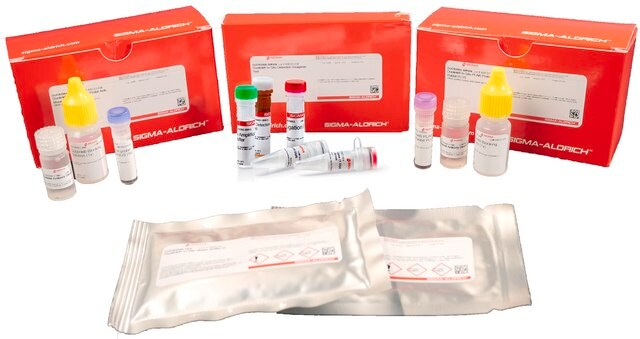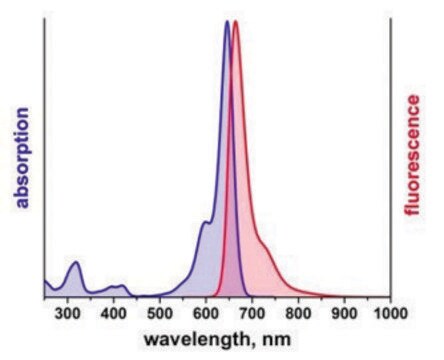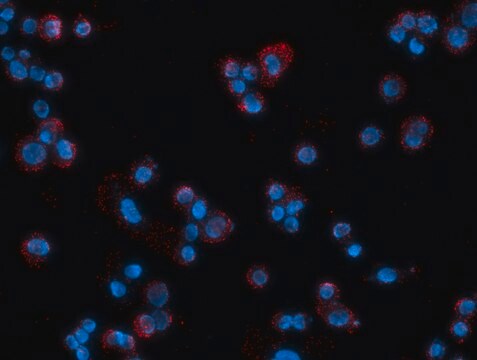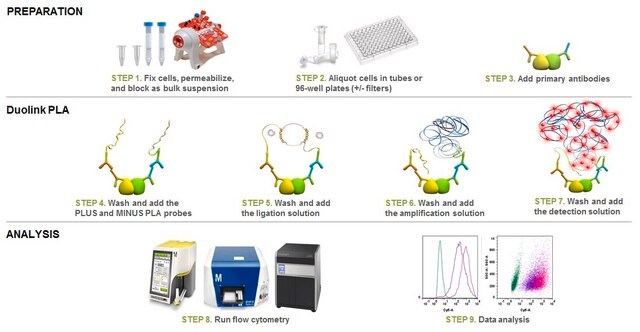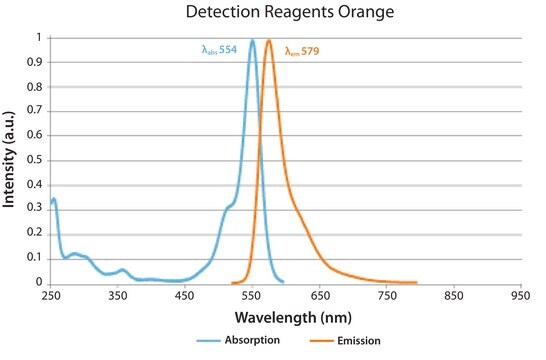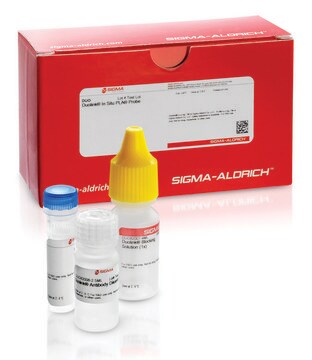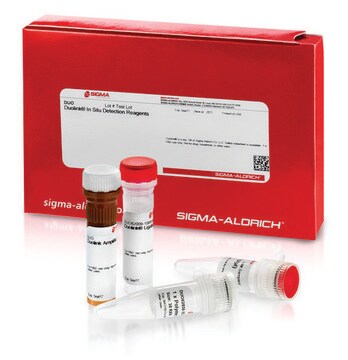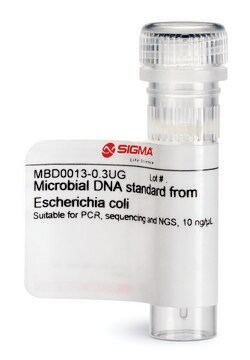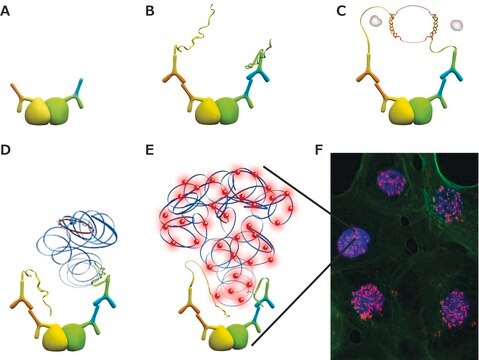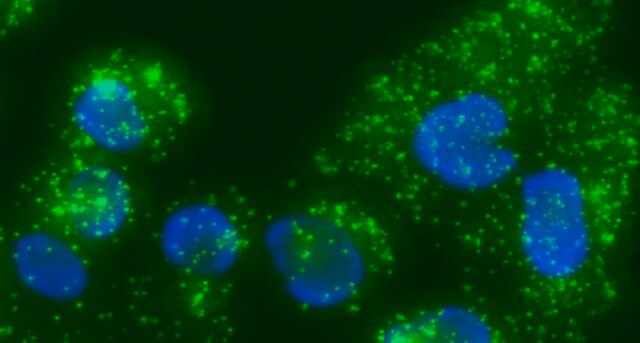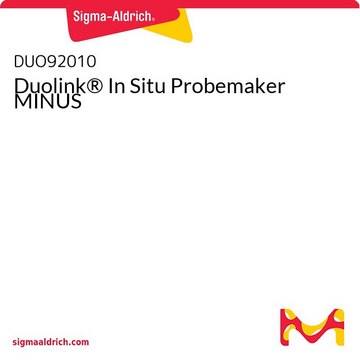Wichtige Dokumente
DUO94005
Duolink® flowPLA Detection Kit - Violet
Duolink® PLA kit for Flow Cytometry with Violet Detection
Synonym(e):
in situ Proximity Ligation Assay, Flowcytometry-PLA, Protein Protein Interaction Kit
About This Item
Empfohlene Produkte
Produktlinie
Duolink®
Methode(n)
flow cytometry: suitable
immunofluorescence: suitable
proximity ligation assay: suitable
Fluoreszenz
λex 390 nm; λem 476 nm
Eignung
suitable for fluorescence
Versandbedingung
dry ice
Lagertemp.
−20°C
Verwandte Kategorien
Anwendung
Violet Fluorescence Detection Reagents
Use appropriate laser for ?ex 390 nm excitation
Use appropriate filter for ?em 476 nm emission
Application Note
Primary antibodies are needed. Test your primary antibodies (IgG-class, mono- or polyclonal) in a standard immunofluorescence (IF), immunohistochemistry (IHC), or immunocytochemistry (ICC) assay to determine the optimal fixation, blocking, and titer conditions. Flow validated antibodies are recommended.
Let us do the work for you, learn more about our Custom Service Program to accelerate your Duolink® projects
View full Duolink® product list
Duolink® flowPLA Detection Kits will enable sensitive detection of proteins, protein-protein interactions, and protein modifications within cell populations by flow cytometry. To perform a Duolink® flowPLA experiment, you will need fixed, suspended cells, two primary antibodies that specifically recognize your proteins of interest, a pair of PLA probes (one 100RXN PLUS and one 100 RXN MINUS), wash buffer and a Duolink® flowPLA Detection Kit. The flowPLA Kits are available with 5 different fluorophores: Violet, Green, Orange, Red, or FarRed. The flowPLA Kits contain all the necessary reagents to perform the amplification and detection of bound PLA probes by flow cytometry. Analysis is carried out using standard flow cytometry assay equipment. User must provide a fixed cell suspension, primary antibodies, and corresponding PLA Probes.
Follow the Duolink® PLA Flow Cytometry Protocol to use this product.
Visit our Duolink® PLA Flow Cytometry page on how to run a Duolink® flow experiment, applications, troubleshooting, and more.
Leistungsmerkmale und Vorteile
- Analyze protein protein interactions with flow cytometry readout
- Analyze cell populations with Proximity Ligation Assay
- Increased sensitivity due to rolling circle amplification for low abundant targets
- No overexpression or genetic manipulation required
- Relative quantification possible
- Works with any flow cytometer instrumentation
- Easy to follow flexible protocol
- Publication-ready results
Komponenten
- 5x Detection Solution - Violet (DUO84005)
- 5x Ligation Buffer (DUO82009)
- 5x Amplification Buffer (DUO82050)
- Ligase (1U/μL)
- Polymerase (10U/μL)
See datasheet for more information.
Rechtliche Hinweise
Signalwort
Danger
H-Sätze
P-Sätze
Gefahreneinstufungen
Resp. Sens. 1
Lagerklassenschlüssel
10 - Combustible liquids
Hier finden Sie alle aktuellen Versionen:
Analysenzertifikate (COA)
Die passende Version wird nicht angezeigt?
Wenn Sie eine bestimmte Version benötigen, können Sie anhand der Lot- oder Chargennummer nach einem spezifischen Zertifikat suchen.
Besitzen Sie dieses Produkt bereits?
In der Dokumentenbibliothek finden Sie die Dokumentation zu den Produkten, die Sie kürzlich erworben haben.
Kunden haben sich ebenfalls angesehen
Artikel
Considerations for proper experimental design, preparation and execution of the Duolink® PLA for flow cytometry protocol.
Duolink® Proximity Ligation Assay kits for Flow Cytometry
General tips and tricks for proper experiment execution, aid in identifying potential problems, and provide solutions to ensure a successful Duolink® PLA experiment for flow cytometry.
Unser Team von Wissenschaftlern verfügt über Erfahrung in allen Forschungsbereichen einschließlich Life Science, Materialwissenschaften, chemischer Synthese, Chromatographie, Analytik und vielen mehr..
Setzen Sie sich mit dem technischen Dienst in Verbindung.